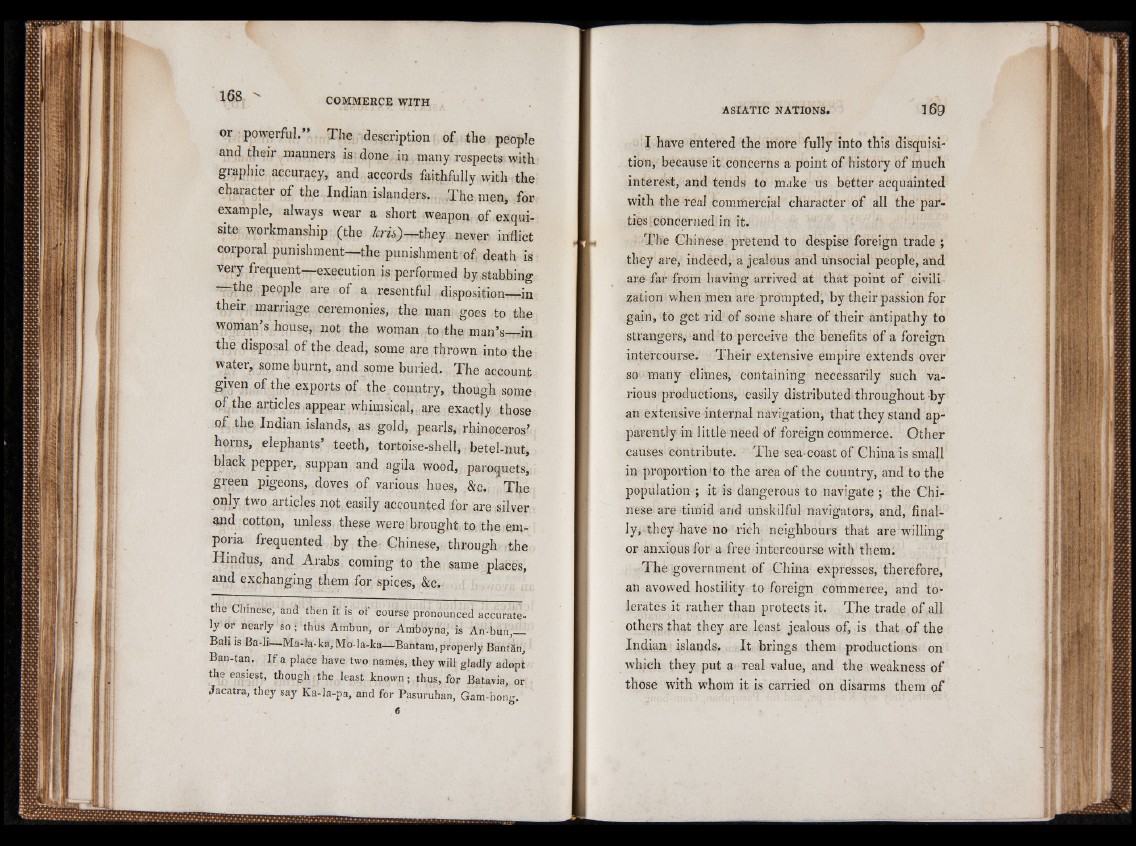
or powerful.” The description of the people
and their manners is done in many respects with
graphic accuracy, and accords faithfully with the
character of the Indian islanders., .The men, for
example, always wear a short weapon of exquisite
workmanship (the kris)— they never inflict
corporal punishment—the punishment of death is
very frequent—execution is performed by stabbing
— the people are of a resentful disposition—in
their marriage ceremonies, the man goes to the
woman’s house, not the woman to the man’s—in
the disposal of the dead, some are thrown into the
water, some burnt, and some buried. The account
given of the exports of the country, though some
of the articles appear whimsical, are exactly those
of the Indian islands, as gold, pearls, rhinoceros’
horns, elephants’ teeth, tortoise-shell, betel-nut,
black pepper, suppan and agila wood, paroquets,
green pigeons, doves of various hues, &c. The
only two articles not easily accounted for are silver
and cotton, unless these were brought to the emporia
frequented by the Chinese, through the
Hindus, and Arabs coming to the same places,
and exchanging them for spices, &c.
the Chinese, and then it is of course pronounced accurately
or nearly so ; thiis Arnbun, or Amboyna, is An-bun,__
Baii is Ba-li Ma-ta-ka/Mo-Ia-ka—Bantam, properly Bantàn,
Ban-tan. If a place have two names, they will gladly adopt
th? easiest, though the least known ; thus, for Batavia, or
Jacatra, they say Ka-la-pa, and for Pasuruhan, Gam-bong. 6
I have entered the more fully into this disquisition,
because it concerns a point of history of much
interest, and tends to make us better acquainted
with the real commercial character of all the parties
:Concerned in it.
The Chinese pretend to despise foreign trade ;
they are, indeed, a jealous and unsocial people, and
are far from having arrived at that point of civilization
when men are prompted, by their passion for
gain, to get rid of some share of their antipathy to
strangers, and to perceive the benefits of a foreign
intercourse. Their extensive empire extends over
so many climes, containing necessarily such various
productions, easily distributed throughout -by
an extensive internal navigation, that they stand apparently
in little need of foreign commerce. Other
causes contribute. The sea-coast of China is small
in proportion to the area of the country, and to the
population ; it is dangerous to navigate ; the Chinese
are timid and unskilful navigators, and, finally,
they have no rich neighbours that are willing
or anxious for a free intercourse with them.
The government of China expresses, therefore,
an avowed hostility to foreign commerce, and tolerates
it rather than protects it. The trade of all
others that they are least jealous of, is that of the
Indian islands. It brings them productions on
which they put a real value, and the weakness of
those with whom it is carried on disarms them of